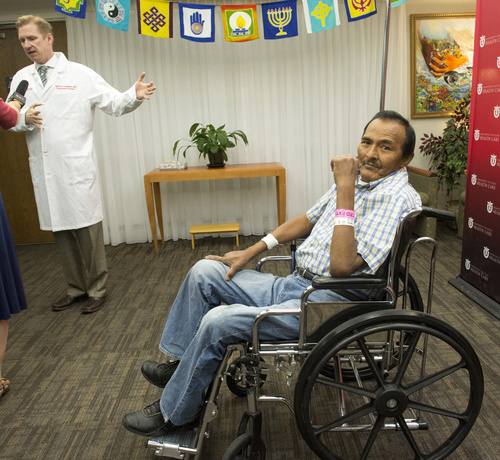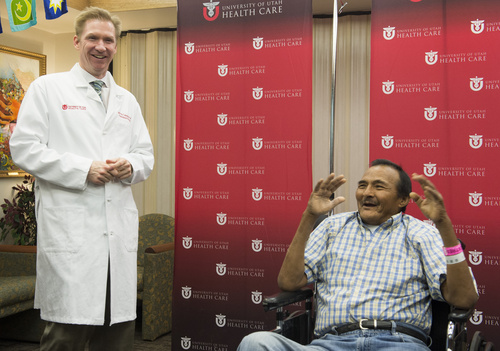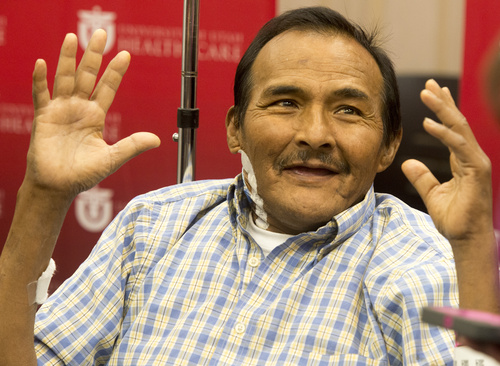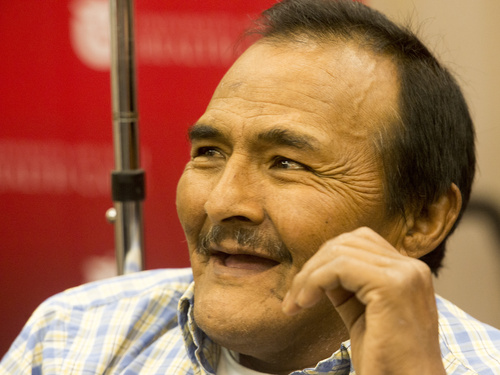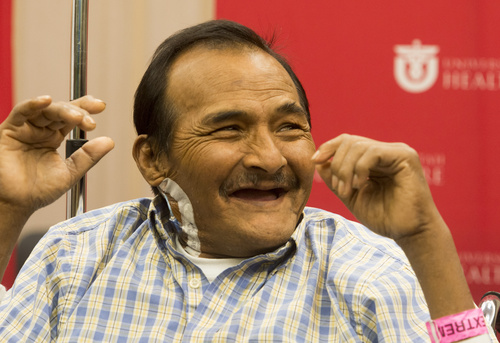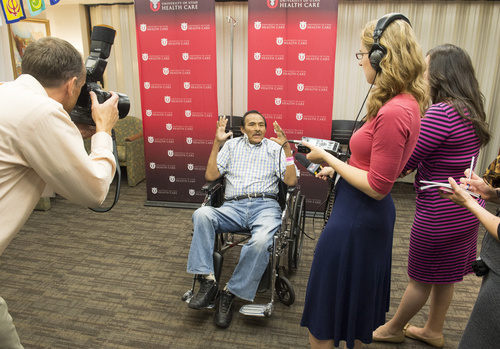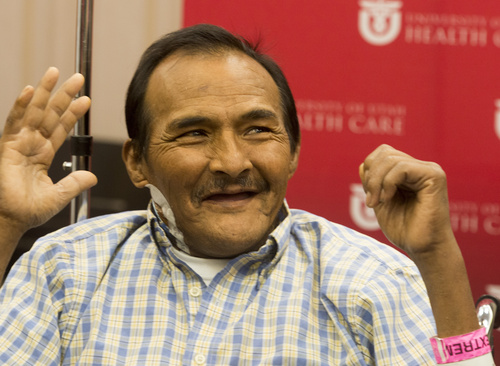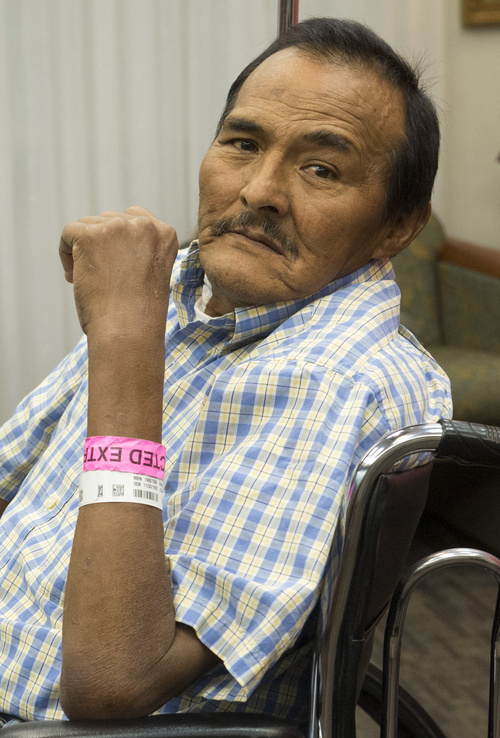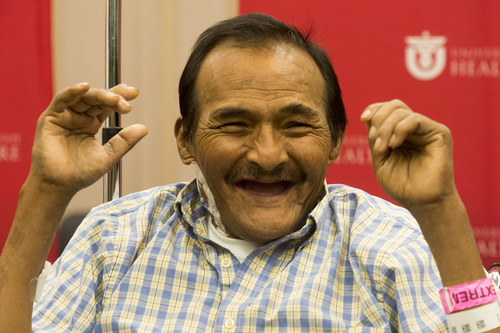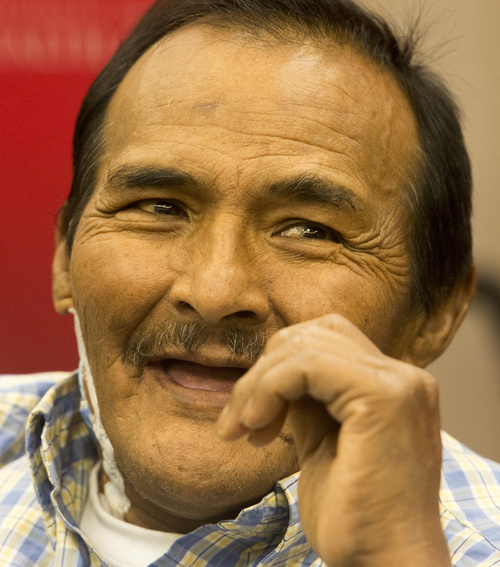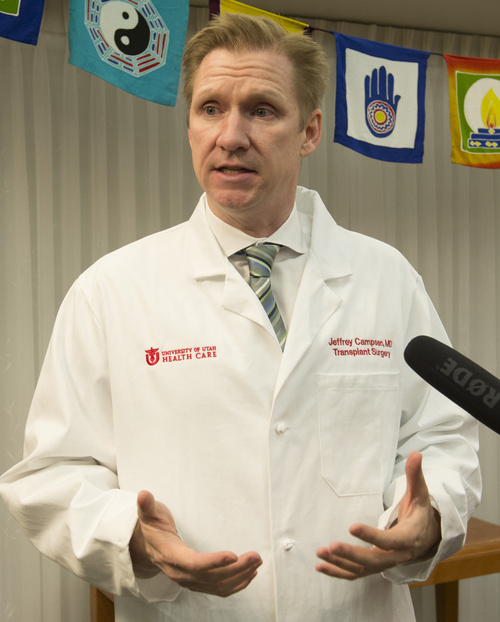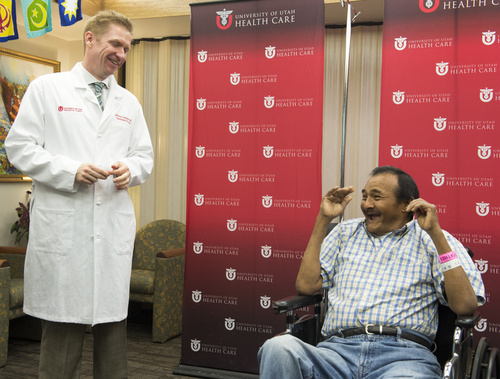Rick Egan | The Salt Lake Tribune
Dr. Jeff Campsen, surgical director of kidney transplants at the University of Utah (left) ta
Rick Egan | The Salt Lake Tribune
Dr. Jeff Campsen, surgical director of kidney transplants at the University of Utah (left) ta
Rick Egan | The Salt Lake Tribune
Andres Galvan talks about his new kidney. Galvan is believed to be the first patient in Utah
Rick Egan | The Salt Lake Tribune
Andres Galvan talks about his new kidney. Galvan is believed to be the first patient in Utah
Rick Egan | The Salt Lake Tribune
Andres Galvan talks about his new kidney. Galvan is believed to be the first patient in Utah
Rick Egan | The Salt Lake Tribune
Andres Galvan talks about his new kidney. Galvan is believed to be the first patient in Utah
Rick Egan | The Salt Lake Tribune
Andres Galvan talks about his new kidney. Galvan is believed to be the first patient in Utah
Rick Egan | The Salt Lake Tribune
Andres Galvan talks about his new kidney. Galvan is believed to be the first patient in Utah
Rick Egan | The Salt Lake Tribune
Andres Galvan talks about his new kidney. Galvan is believed to be the first patient in Utah
Rick Egan | The Salt Lake Tribune
Andres Galvan talks about his new kidney. Galvan is believed to be the first patient in Utah
Rick Egan | The Salt Lake Tribune
Andres Galvan talks Thursday about his new kidney. Galvan is believed to be the first patient
Rick Egan | The Salt Lake Tribune
Andres Galvan talks about his new kidney. Galvan is believed to be the first patient in Utah
Rick Egan | The Salt Lake Tribune
Dr. Jeff Campsen, surgical director of kidney transplants at the University of Utah (left) ta
Rick Egan | The Salt Lake Tribune
Dr. Jeff Campsen, surgical director of kidney transplants at the University of Utah (left) ta
Rick Egan | The Salt Lake Tribune
Dr. Jeff Campsen, surgical director of kidney transplants at the University of Utah (left) talks about Andres Galvan's kidney transplant, which is believed to be the first kidney transplant in Utah using an organ from a donor with hepatitis C and into a patient with hepatitis C. Thursday, July 31, 2014
Rick Egan | The Salt Lake Tribune
Dr. Jeff Campsen, surgical director of kidney transplants at the University of Utah (left) talks about Andres Galvan's kidney transplant, which is believed to be the first kidney transplant in Utah using an organ from a donor with hepatitis C and into a patient with hepatitis C. Thursday, July 31, 2014
Rick Egan | The Salt Lake Tribune
Andres Galvan talks about his new kidney. Galvan is believed to be the first patient in Utah with hepatitis C who has received a kidney transplant using an organ from a donor with hepatitis C. Thursday, July 31, 2014
Rick Egan | The Salt Lake Tribune
Andres Galvan talks about his new kidney. Galvan is believed to be the first patient in Utah with hepatitis C who has received a kidney transplant using an organ from a donor with hepatitis C. Thursday, July 31, 2014
Rick Egan | The Salt Lake Tribune
Andres Galvan talks about his new kidney. Galvan is believed to be the first patient in Utah with hepatitis C who has received a kidney transplant using an organ from a donor with hepatitis C. Thursday, July 31, 2014
Rick Egan | The Salt Lake Tribune
Andres Galvan talks about his new kidney. Galvan is believed to be the first patient in Utah with hepatitis C who has received a kidney transplant using an organ from a donor with hepatitis C. Thursday, July 31, 2014
Rick Egan | The Salt Lake Tribune
Andres Galvan talks about his new kidney. Galvan is believed to be the first patient in Utah with hepatitis C who has received a kidney transplant using an organ from a donor with hepatitis C. Thursday, July 31, 2014
Rick Egan | The Salt Lake Tribune
Andres Galvan talks about his new kidney. Galvan is believed to be the first patient in Utah with hepatitis C who has received a kidney transplant using an organ from a donor with hepatitis C. Thursday, July 31, 2014
Rick Egan | The Salt Lake Tribune
Andres Galvan talks about his new kidney. Galvan is believed to be the first patient in Utah with hepatitis C who has received a kidney transplant using an organ from a donor with hepatitis C. Thursday, July 31, 2014
Rick Egan | The Salt Lake Tribune
Andres Galvan talks about his new kidney. Galvan is believed to be the first patient in Utah with hepatitis C who has received a kidney transplant using an organ from a donor with hepatitis C. Thursday, July 31, 2014
Rick Egan | The Salt Lake Tribune
Andres Galvan talks Thursday about his new kidney. Galvan is believed to be the first patient in Utah with hepatitis C who has received a kidney transplant using an organ from a donor with hepatitis C.
Rick Egan | The Salt Lake Tribune
Andres Galvan talks about his new kidney. Galvan is believed to be the first patient in Utah with hepatitis C who has received a kidney transplant using an organ from a donor with hepatitis C. Thursday, July 31, 2014
Rick Egan | The Salt Lake Tribune
Dr. Jeff Campsen, surgical director of kidney transplants at the University of Utah (left) talks about Andres Galvan's kidney transplant, which is believed to be the first kidney transplant in Utah using an organ from a donor with hepatitis C and into a patient with hepatitis C. Thursday, July 31, 2014
Rick Egan | The Salt Lake Tribune
Dr. Jeff Campsen, surgical director of kidney transplants at the University of Utah (left) talks about Andres Galvan's kidney transplant, which is believed to be the first kidney transplant in Utah using an organ from a donor with hepatitis C and into a patient with hepatitis C. Thursday, July 31, 2014


